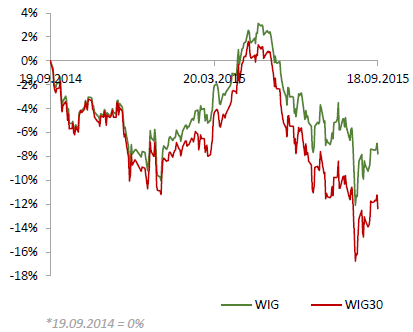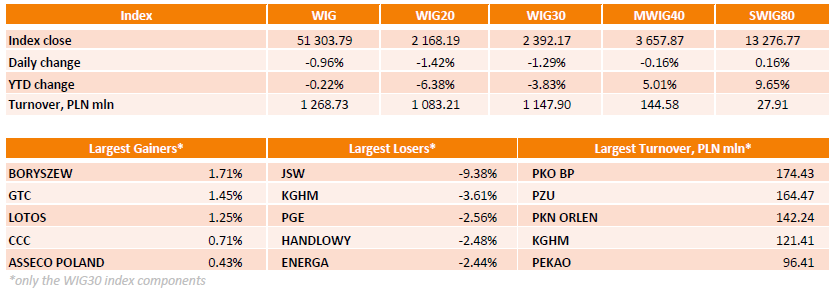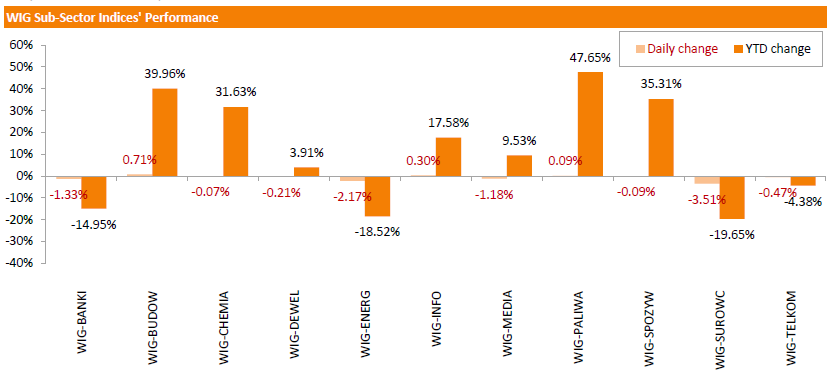Noticias del mercado
-
21:00
DJIA 16435.36 -239.38 -1.44%, NASDAQ 4843.58 -50.37 -1.03%, S&P 500 1965.01 -25.19 -1.27%
-
18:07
WSE: Session Results
Polish equities declined on Friday, with the broad market measure, the WIG Index, losing 0.96%. Sector-wise, materials (-3.51%) and utilities (-2.17%) posted the biggest declines, while construction sector (+0.71%) recorded the largest rise.
The large-cap stocks slump by 1.29%, as measured by the WIG30 Index. Within the index components, JSW (WSE: JSW) suffered the steepest decline, plunging by 9.38% after two days of significant advances. Other major laggards were KGHM (WSE: KGH), PGE (WSE: PGE), HANDLOWY (WSE: BHW) and ENERGA (WSE: ENG), dropping by 2.44-3.61%. On the other side of the ledger, BORYSZEW (WSE: BRS) climbed by 1.71% but on light volume. It was followed by GTC (WSE: GTC) and LOTOS (WSE: LTS), surging by 1.45% and 1.25% respectively.
-
18:00
European stocks close: stocks closed lower on the Fed's outlook of the global economy
Stock indices closed lower on the Fed's outlook of the global economy. The Fed released its interest rate decision on Thursday. The Fed kept its interest rate unchanged at 0.00%-0.25%.
The Fed took into account the slowdown in the global economy and low inflation expectations. That was the main reason to keep the monetary policy unchanged.
"Recent global economic and financial developments may restrain economic activity somewhat and are likely to put further downward pressure on inflation in the near term," the Fed said.
The European Central Bank (ECB) Executive Board member Benoit Coeure said on Friday that monetary policies of the Eurozone and the U.S. have different directions.
"Whatever happens, and whatever the Fed's decision, the monetary trajectories in the euro zone and the United States are very different," he said.
Coeure also said that there is the downside risk to the global outlook.
He noted that the inflation and growth in the Eurozone are expected to be lower than previously expected.
Coeure pointed out that the central bank could extend its asset-buying programme if needed.
Meanwhile, the Eurozone's current account surplus declined slightly. Eurozone's current account surplus fell to a seasonally adjusted €22.6 billion in July from €24.9 billion in June. June's figure was revised down from a surplus of €25.4 billion.
The trade surplus rose to €26.9 billion in July from €26.6 billion in July, while primary income increased to €2.8 billion from €1.2 billion.
The surplus on services declined to €3.6 billion in July from €5.6 billion in June, while the secondary income increased to €10.7 billion from €8.4 billion.
Eurozone's unadjusted current account surplus soared to €33.3 billion in July from EUR 30.6 billion in June. June's figure was revised down from a surplus of €31.1 billion.
The Bank of England Chief Economist Andrew Haldane said in a speech on Friday that the central bank should lower its interest rate to boost inflation.
"Were the downside risks I have discussed to materialise, there could be a need to loosen rather than tighten the monetary reins as a next step to support UK growth and return inflation to target," he said.
Indexes on the close:
Name Price Change Change %
FTSE 100 6,104.11 -82.88 -1.34 %
DAX 9,916.16 -313.42 -3.06 %
CAC 40 4,535.85 -119.29 -2.56 %
-
18:00
European stocks closed: FTSE 6104.11 -82.88 -1.34%, DAX 9916.16 -313.42 -3.06%, CAC 40 4535.85 -119.29 -2.56%
-
17:17
Wall Street. Major U.S. stock-indexes fell
Major U.S. stock-indexes sharply lower on Friday after the Federal Reserve's decision to hold interest rates exacerbated worries about the health of the global economy. Apart from the state of the world economy, the Fed cited financial market volatility and sluggish inflation at home in its decision to leave rates unchanged, but left the door open for a modest policy tightening later this year.
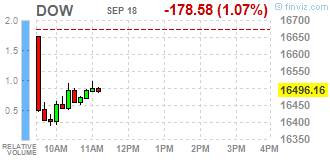
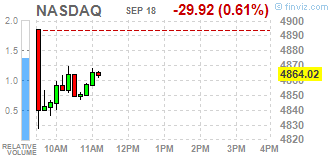
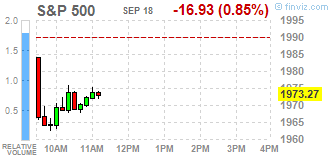
Almost all of Dow stocks in negative area (28 of 30). Top looser - Merck & Co. Inc. (MRK, -3.37%). Top gainer - The Procter & Gamble Company (PG, +0.58).
Almost all of S&P index sectors also in negative area. Top looser - Basic Materials (-1.5%). Top gainer - Utilities (+0,1%).
At the moment:
Dow 16652.00 -12.00 -0.07%
S&P 500 1986.50 -1.50 -0.08%
Nasdaq 100 4376.50 -4.50 -0.10%
10 Year yield 2,17% -0,05
Oil 47.00 -0.15 -0.32%
Gold 1117.80 -1.20 -0.11%
-
16:39
U.S. leading economic index increases 0.1% in August
The Conference Board released its leading economic index for the U.S. on Friday. The leading economic index increased by 0.1% in August, missing expectations a 0.2% gain, after a flat reading in July. July's figure was revised up from a 0.2% decrease.
Five of the ten indicators rose.
"Average working hours and new orders in manufacturing have been weak, pointing to more slow growth in the industrial sector. However, employment, personal income and manufacturing and trade sales have all been rising, helping to offset the weakness in industrial production in recent months," director of business cycles and growth research at The Conference Board, Ataman Ozyildirim, said.
-
15:47
Construction production in Italy rises 0.3% in July
The Italian statistical office Istat released its construction output data on Friday. Construction production in Italy was up at on a seasonally adjusted rate of 0.3% in July, after a 1.2% drop in June.
On a yearly basis, construction output declined at a calendar-adjusted rate of 0.6% in July, after a 0.8% rise in June.
-
15:34
U.S. Stocks open: Dow -1.13%, Nasdaq -1.19%, S&P -0.90%
-
15:29
European Central Bank Executive Board member Benoit Coeure: monetary policies of the Eurozone and the U.S. have different directions
The European Central Bank (ECB) Executive Board member Benoit Coeure said on Friday that monetary policies of the Eurozone and the U.S. have different directions.
"Whatever happens, and whatever the Fed's decision, the monetary trajectories in the euro zone and the United States are very different," he said.
Coeure also said that there is the downside risk to the global outlook.
He noted that the inflation and growth in the Eurozone are expected to be lower than previously expected.
Coeure pointed out that the central bank could extend its asset-buying programme if needed.
-
15:23
Before the bell: S&P futures -0.94%, NASDAQ futures -0.93%
U.S. stock-index futures fell as investors speculated the Federal Reserve's refusal to raise rates bespeaks larger concerns about the strength of the global economy.
Global Stocks:
Nikkei 18,070.21 -362.06 -1.96%
Hang Seng 21,920.83 +66.20 +0.30%
Shanghai Composite 3,099.12 +13.05 +0.42%
FTSE 6,093.64 -93.35 -1.51%
CAC 4,531.83 -123.31 -2.65%
DAX 9,927.41 -302.17 -2.95%
Crude oil $45.56 (-2.86%)
Gold $1137.00 (+1.80%)
-
15:18
Bank of England Chief Economist Andrew Haldane: the central bank should lower its interest rate to boost inflation
The Bank of England Chief Economist Andrew Haldane said in a speech on Friday that the central bank should lower its interest rate to boost inflation.
"Were the downside risks I have discussed to materialise, there could be a need to loosen rather than tighten the monetary reins as a next step to support UK growth and return inflation to target," he said.
-
15:03
Wall Street. Stocks before the bell
(company / ticker / price / change, % / volume)
Barrick Gold Corporation, NYSE
ABX
6.94
1.46%
48.4K
FedEx Corporation, NYSE
FDX
149.49
0.00%
0.1K
AT&T Inc
T
32.60
-0.55%
15.5K
International Paper Company
IP
40.68
-0.56%
1.5K
American Express Co
AXP
76.60
-0.60%
0.4K
UnitedHealth Group Inc
UNH
122.50
-0.62%
1.4K
Cisco Systems Inc
CSCO
25.68
-0.77%
8.8K
ALTRIA GROUP INC.
MO
54.25
-0.80%
0.3K
Walt Disney Co
DIS
103.35
-0.82%
25.7K
Verizon Communications Inc
VZ
44.85
-0.84%
7.8K
Twitter, Inc., NYSE
TWTR
27.18
-0.84%
11.3K
Facebook, Inc.
FB
93.54
-0.85%
140.8K
McDonald's Corp
MCD
97.00
-0.86%
1.7K
Apple Inc.
AAPL
112.92
-0.88%
288.8K
Ford Motor Co.
F
14.47
-0.89%
6.0K
Johnson & Johnson
JNJ
93.95
-0.94%
1.1K
Home Depot Inc
HD
116.79
-0.95%
2.1K
Procter & Gamble Co
PG
69.55
-0.98%
1K
Yandex N.V., NASDAQ
YNDX
12.97
-0.99%
3.1K
Intel Corp
INTC
29.41
-1.01%
7.3K
Amazon.com Inc., NASDAQ
AMZN
533.26
-1.04%
13.2K
International Business Machines Co...
IBM
146.56
-1.07%
0.6K
General Electric Co
GE
25.07
-1.10%
40.6K
Wal-Mart Stores Inc
WMT
63.75
-1.12%
2.5K
Google Inc.
GOOG
635.51
-1.15%
5.7K
General Motors Company, NYSE
GM
30.94
-1.18%
2.4K
Nike
NKE
113.90
-1.19%
0.2K
Starbucks Corporation, NASDAQ
SBUX
56.60
-1.19%
0.5K
E. I. du Pont de Nemours and Co
DD
47.50
-1.21%
0.5K
Boeing Co
BA
135.77
-1.22%
0.3K
The Coca-Cola Co
KO
38.90
-1.22%
4.7K
JPMorgan Chase and Co
JPM
61.88
-1.23%
5.9K
Microsoft Corp
MSFT
43.70
-1.24%
10.4K
Chevron Corp
CVX
78.42
-1.25%
7.3K
Merck & Co Inc
MRK
53.28
-1.26%
0.5K
Hewlett-Packard Co.
HPQ
27.20
-1.34%
1.1K
Visa
V
70.00
-1.35%
2.8K
Exxon Mobil Corp
XOM
73.45
-1.36%
14.3K
Yahoo! Inc., NASDAQ
YHOO
30.51
-1.36%
40.4K
Pfizer Inc
PFE
33.02
-1.37%
0.2K
Goldman Sachs
GS
183.88
-1.38%
0.7K
Citigroup Inc., NYSE
C
50.92
-1.41%
84.1K
Caterpillar Inc
CAT
73.00
-1.43%
0.1K
Tesla Motors, Inc., NASDAQ
TSLA
258.33
-1.43%
14.2K
ALCOA INC.
AA
9.80
-1.51%
18.6K
Freeport-McMoRan Copper & Gold Inc., NYSE
FCX
11.30
-6.22%
9.0K
-
14:47
Upgrades and downgrades before the market open
Upgrades:
Downgrades:
Other:
Barrick Gold (ABX) target lowered to $8 at RBC Capital Mkts
Freeport-McMoRan (FCX) initiated at Mkt Perform at FBR Capital; target $18
-
14:42
Canadian consumer price inflation is flat in August
Statistics Canada released consumer price inflation data on Friday. Canadian consumer price inflation was flat in August, in line with expectations, after a 0.1% gain in July.
On a yearly basis, the consumer price index remained unchanged at 1.3% in August, in line with expectations.
The consumer price index was partly driven by higher food prices. Food prices climbed 3.6% year-on-year in August, while household operations, furnishings and equipment prices increased 2.5%.
Alcoholic beverages and tobacco prices climbed by 2.8% in August from the same month a year earlier, while gasoline prices dropped 12.6%.
The Canadian core consumer price index, which excludes some volatile goods, rose 0.2% in August, after a flat reading in July.
On a yearly basis, core consumer price index in Canada was down to 2.1% in August from 2.4% in July, in line with expectations.
The Bank of Canada's inflation target is 2.0%.
-
14:29
Greek industrial turnover slides 15.4% in July
The Hellenic Statistical Authority released its preliminary industrial turnover data for Greece on Friday. Greek overall turnover index slid 15.4% year-on-year in July, after a 12.9% drop in June.
Domestic market turnover fell at an annual rate of 17.8% in July, while foreign market turnover plunged by 11.7%.
Turnover in the manufacturing sector declined at an annual rate of 15.2% in July, while mining and quarrying turnover dropped by 22.8%.
-
14:19
Italy’s current account surplus falls to €6.65 billion in July
The Bank of Italy released its current account data on Friday. Italy's current account surplus declined to €6.65 billion in July from €7.63 billion in July last year.
The goods trade surplus decreased to €6.43 billion in July from €7.42 billion in July last year. The services trade balance fell to a surplus of €1.22 billion from €1.27 billion.
The capital account surplus turned to a deficit of €95 million in July from a surplus of €195 million last year, while the financial account surplus rose to €11.6 billion from €4.27 billion.
-
12:00
European stock markets mid session: stocks traded lower on the Fed’s outlook of the global economy
Stock indices traded lower on the Fed's outlook of the global economy. The Fed released its interest rate decision on Thursday. The Fed kept its interest rate unchanged at 0.00%-0.25%.
The Fed took into account the slowdown in the global economy and low inflation expectations. That was the main reason to keep the monetary policy unchanged.
"Recent global economic and financial developments may restrain economic activity somewhat and are likely to put further downward pressure on inflation in the near term," the Fed said.
Meanwhile, the Eurozone's current account surplus declined slightly. Eurozone's current account surplus fell to a seasonally adjusted €22.6 billion in July from €24.9 billion in June. June's figure was revised down from a surplus of €25.4 billion.
The trade surplus rose to €26.9 billion in July from €26.6 billion in July, while primary income increased to €2.8 billion from €1.2 billion.
The surplus on services declined to €3.6 billion in July from €5.6 billion in June, while the secondary income increased to €10.7 billion from €8.4 billion.
Eurozone's unadjusted current account surplus soared to €33.3 billion in July from EUR 30.6 billion in June. June's figure was revised down from a surplus of €31.1 billion.
Current figures:
Name Price Change Change %
FTSE 100 6,157.58 -29.41 -0.48 %
DAX 10,025.17 -204.41 -2.00 %
CAC 40 4,580.32 -74.82 -1.61 %
-
11:53
Reserve Bank of Australia Glenn Stevens: the labour market in Australia seems to improve
The Reserve Bank of Australia Glenn Stevens said before the House of Representatives Standing Committee on Economics on late Thursday evening that a weaker Australian dollar begins to have a positive impact on the activity of companies, but the Australian economy expanded slower than expected.
The RBA governor noted that the labour market in Australia seems to improve.
"The labour force participation rate and the ratio of employment to population have both started to increase. The rate of unemployment, though variable from month to month, seems to have stopped rising," he said.
Stevens also said that resources sector exports rose strongly.
But he pointed out that the outlook depends on the global developments.
"Global factors will be important and the international setting continues to be a rather complex one. Since the last hearing, growth in the Chinese economy has continued to moderate. Growth in other parts of Asia was also weaker around the middle of the year. Reflecting these outcomes, forecasts for global growth over the period ahead are a little lower than they were six months ago," he said.
Stevens also said that the uncertainty over the Fed's is likely to weigh on the markets. But the RBA governor expects that the Fed will probably raise its interest rate before Christmas.
-
11:36
Bank of Japan’s August monetary policy meeting minutes: the country’s economy is expected to continue to recover moderately, but there are downside risks to the recovery
The Bank of Japan (BoJ) released its August monetary policy meeting minutes on late Thursday. According to minutes, the country's economy continued to recover.
Board members noted that there is the slowdown in emerging economies but the economies were likely to improve from a longer-term perspective.
Many board members wanted to monitor closely how Japan's exports could be effected by further slowdown in emerging economies, including China.
The central bank expects the country's economy to recover moderately.
"With regard to the outlook, Japan's economy is expected to continue recovering moderately. The year-on-year rate of increase in the CPI is likely to be about 0 percent for the time being, due to the effects of the decline in energy prices," the minutes said.
There are downside risks to the recovery in Japan from developments in emerging and commodity-driven economies as well as the debt problem and the momentum of economic activity and prices in Europe and the pace of recovery in the US. Economy, the minutes said.
Private consumption was resilient, while housing investment picked up, the central bank noted.
Minutes showed that the central bank wants to continue its monetary policy until the 2% inflation target will be reached, and it will adjust its monetary policy if needed.
The BoJ decided to keep unchanged its monetary policy at its August meeting.
-
11:06
Eurozone’s current account surplus falls to a seasonally adjusted €22.3 billion in July
The European Central Bank (ECB) released its current account on Friday. Eurozone's current account surplus fell to a seasonally adjusted €22.6 billion in July from €24.9 billion in June. June's figure was revised down from a surplus of €25.4 billion.
The trade surplus rose to €26.9 billion in July from €26.6 billion in July, while primary income increased to €2.8 billion from €1.2 billion.
The surplus on services declined to €3.6 billion in July from €5.6 billion in June, while the secondary income increased to €10.7 billion from €8.4 billion.
Eurozone's unadjusted current account surplus soared to €33.3 billion in July from EUR 30.6 billion in June. June's figure was revised down from a surplus of €31.1 billion.
-
10:54
The Fed keeps its monetary unchanged in September
The Fed released its interest rate decision on Thursday. The Fed kept its interest rate unchanged at 0.00%-0.25%. This decision was not unexpected.
The Fed took into account the slowdown in the global economy and low inflation expectations. That was the main reason to keep the monetary policy unchanged.
"Recent global economic and financial developments may restrain economic activity somewhat and are likely to put further downward pressure on inflation in the near term," the Fed said.
The accompanying statement and comments by the Fed Chairwoman Janet Yellen were more dovish than expected. The Fed did not announce any new guidelines on the terms of the first interest rate hike.
"When the Committee decides to begin to remove policy accommodation, it will take a balanced approach consistent with its longer-run goals of maximum employment and inflation of 2 percent," the Fed said.
The Fed pointed out that the pace of the interest rate hike will be slower than expected earlier once that the Fed starts raising its interest rates. GDP for 2016 and 2017 were downgraded.
The number of members awaiting the interest rates this year declined. 13 of 17 FOMC members are awaiting that the Fed starts raising its interest rates this year, down from 15 earlier.
FOMC members voted 9-1 to keep interest rates unchanged. Only Richmond Fed President Jeffrey Lacker voted to raise interest rate by 0.25%.
Yellen noted that the developments abroad had impact on the Fed's decision.
"The outlook abroad appears to have become less certain," she said, adding that the Fed "judged it appropriate to wait".
The Fed chairwoman pointed out that the interest rate hike in October is possible.
-
10:40
The number of initial and renewal claims for unemployment insurance benefits in Canada declines by 12.6% in July
Statistics Canada reported on Thursday that the number of initial and renewal claims for unemployment insurance benefits in Canada declined by 12.6% to 229,200 in July from a year earlier.
On a monthly basis, claims fell by 1.5% in July.
The largest decrease was recorded in Ontario. Claims in Ontario dropped by 28.0%.
The number of people receiving regular jobless benefits in July rose 2.0% from the previous month. The increase was driven by rises in British Columbia and Ontario.
-
10:18
Bloomberg Consumer Comfort Index: consumers’ expectations for U.S. economy decline to 44.5 in the week ended September 13
According to data from the Bloomberg Consumer Comfort Index, consumers' expectations for U.S. economy declined to 44.5 in in the week ended September 13 from 46.0 the prior week. The slowdown in the global economy was one of the reasons for the decline.
The measure of views of the economy decreased to 30.9 from 33.3.
The buying climate index fell by 1 point to 34.9.
The personal finances index was down to 54.9 from 55.1.
-
08:30
Global Stocks: U.S. indices closed mixed after the Fed left interest rates unchanged
U.S. stock indices closed mixed on Thursday after Fed policymakers voted 9-1 to keep interest rates unchanged due to instability in overseas economies. Low inflation was also a source of concerns. "And overall the labor market conditions have continued to improve. Inflation, however, has continued to run below our longer-run objective. Partly reflecting declines in energy and import prices," Fed Chair Janet Yellen said.
It's still uncertain when the first rate hike in nearly a decade will be conducted. Yellen reiterated that markets should pay less attention to the timing of the first interest rate hike and more attention to the expected pattern of rates.
The Dow Jones Industrial Average fell 65.21 points, or 0.39%, to 16,674.74. The S&P 500 lost 5.11 points, or 0.26%, to 1,990.20. The Nasdaq Composite Index climbed 4.71 points, or 0.10%, to 4,893.95.
This morning in Asia Hong Kong Hang Seng rose 0.29%, or 63.90 points, to 21,918.53. China Shanghai Composite Index gained 0.32%, or 9.73 point, to 3,095.79. The Nikkei lost 1.46%, or 269.68 points, to 18,162.59.
Asian stock indices traded mixed amid the Fed's decision.
Japanese stocks declined amid absence of a rate hike in the U.S. and a stronger yen.
Chinese stocks were supported by data from the National Bureau of Statistics, which showed average new home prices in China rose for the fourth straight month in August.
-
04:02
Nikkei 225 18,207.28 -224.99 -1.22 %, Hang Seng 21,964 +109.37 +0.50 %, Shanghai Composite 3,084.88 -1.19 -0.04 %
-
00:30
Stocks. Daily history for Sep 17’2015:
(index / closing price / change items /% change)
Nikkei 225 18,432.27 +260.67 +1.43 %
Hang Seng 21,854.63 -112.03 -0.51 %
S&P/ASX 200 5,146.82 +47.96 +0.94 %
Shanghai Composite 3,086.6 -65.67 -2.08 %
FTSE 100 6,186.99 -42.22 -0.68 %
CAC 40 4,655.14 +9.30 +0.20 %
Xetra DAX 10,229.58 +2.37 +0.02 %
S&P 500 1,990.2 -5.11 -0.26 %
NASDAQ Composite 4,893.95 +4.71 +0.10 %
Dow Jones 16,674.74 -65.21 -0.39 %
-
